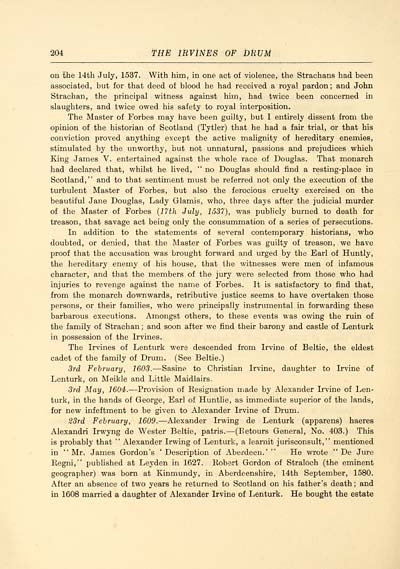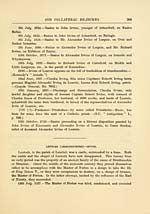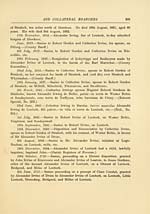Irvines of Drum and collateral branches
(224) Page 204
Download files
Complete book:
Individual page:
Thumbnail gallery: Grid view | List view

204 THE IRVINES OF DRUM
on the 14th July, 1537. With him, in one act of violence, the Strachans had been
associated, but for that deed of blood he had received a royal pardon; and John
Strachan, the principal witness against him, had twice been concerned in
slaughters, and twice owed his safety to royal interposition.
The Master of Forbes may have been guilty, but I entirely dissent from the
opinion of the historian of Scotland (Tytler) that he had a fair trial, or that his
conviction proved anything except the active malignity of hereditary enemies,
stimulated by the unworthy, but not unnatural, passions and prejudices which
King James V. entertained against the whole race of Douglas. That monarch
had declared that, whilst he lived, " no Douglas should find a resting-place in
Scotland," and to that sentiment must be referred not only the execution of the
turbulent Master of Forbes, but also the ferocious cruelty exercised on the
beautiful Jane Douglas, Lady Giamis, who, three days after the judicial murder
of the Master of Forbes (17th July, 1537), was publicly burned to death for
treason, that savage act being only the consummation of a series of persecutions.
In addition to the statements of several contemporary historians, who
doubted, or denied, that the Master of Forbes was guilty of treason, we have
proof that the accusation was brought forward and urged by the Earl of Huntly,
the hereditary enemy of his house, that the witnesses were men of infamous
character, and that the members of the jury were selected from those who had
injuries to revenge against the name of Forbes. It is satisfactory to find that,
from the monarch downwards, retributive justice seems to have overtaken those
persons, or their families, who were principally instrumental in forwarding these
barbarous executions. Amongst others, to these events was owing the ruin of
the family of Strachan; and soon after we find their barony and castle of Lenturk
in possession of the Irvines.
The Irvines of Lenturk were descended from Irvine of Beltie, the eldest
cadet of the family of Drum. (See Beltie.)
3rd February, 1603. — Sasine to Christian Irvine, daughter to Irvine of
Lenturk, on Meikle and Little Maidlairs.
3rd May, 1604. — Provision of Resignation made by Alexander Irvine of Len-
turk, in the hands of George, Earl of Huntlie, as immediate superior of the lands,
for new infeftment to be given to Alexander Irvine of Drum.
33rd February, 1609. — Alexander Irwing de Lenturk (apparens) haeres
Alexandri Irwyng de Wester Beltie, patris. — (Eetours General, No. 403.) This
is probably that " Alexander Irwing of Lenturk, a learnit jurisconsult," mentioned
in " Mr. James Gordon's ' Description of Aberdeen.' ' He wrote " De Jure
Regni," published at Leyden in 1627. Robert Gordon of Straloch (the eminent
geographer) was born at Kinmundy, in Aberdeenshire, 14th September, 1580.
After an absence of two years he returned to Scotland on his father's death ; and
in 1608 married a daughter of Alexander Irvine of Lenturk. He bought the estate
on the 14th July, 1537. With him, in one act of violence, the Strachans had been
associated, but for that deed of blood he had received a royal pardon; and John
Strachan, the principal witness against him, had twice been concerned in
slaughters, and twice owed his safety to royal interposition.
The Master of Forbes may have been guilty, but I entirely dissent from the
opinion of the historian of Scotland (Tytler) that he had a fair trial, or that his
conviction proved anything except the active malignity of hereditary enemies,
stimulated by the unworthy, but not unnatural, passions and prejudices which
King James V. entertained against the whole race of Douglas. That monarch
had declared that, whilst he lived, " no Douglas should find a resting-place in
Scotland," and to that sentiment must be referred not only the execution of the
turbulent Master of Forbes, but also the ferocious cruelty exercised on the
beautiful Jane Douglas, Lady Giamis, who, three days after the judicial murder
of the Master of Forbes (17th July, 1537), was publicly burned to death for
treason, that savage act being only the consummation of a series of persecutions.
In addition to the statements of several contemporary historians, who
doubted, or denied, that the Master of Forbes was guilty of treason, we have
proof that the accusation was brought forward and urged by the Earl of Huntly,
the hereditary enemy of his house, that the witnesses were men of infamous
character, and that the members of the jury were selected from those who had
injuries to revenge against the name of Forbes. It is satisfactory to find that,
from the monarch downwards, retributive justice seems to have overtaken those
persons, or their families, who were principally instrumental in forwarding these
barbarous executions. Amongst others, to these events was owing the ruin of
the family of Strachan; and soon after we find their barony and castle of Lenturk
in possession of the Irvines.
The Irvines of Lenturk were descended from Irvine of Beltie, the eldest
cadet of the family of Drum. (See Beltie.)
3rd February, 1603. — Sasine to Christian Irvine, daughter to Irvine of
Lenturk, on Meikle and Little Maidlairs.
3rd May, 1604. — Provision of Resignation made by Alexander Irvine of Len-
turk, in the hands of George, Earl of Huntlie, as immediate superior of the lands,
for new infeftment to be given to Alexander Irvine of Drum.
33rd February, 1609. — Alexander Irwing de Lenturk (apparens) haeres
Alexandri Irwyng de Wester Beltie, patris. — (Eetours General, No. 403.) This
is probably that " Alexander Irwing of Lenturk, a learnit jurisconsult," mentioned
in " Mr. James Gordon's ' Description of Aberdeen.' ' He wrote " De Jure
Regni," published at Leyden in 1627. Robert Gordon of Straloch (the eminent
geographer) was born at Kinmundy, in Aberdeenshire, 14th September, 1580.
After an absence of two years he returned to Scotland on his father's death ; and
in 1608 married a daughter of Alexander Irvine of Lenturk. He bought the estate
Set display mode to:
![]() Universal Viewer |
Universal Viewer | ![]() Mirador |
Large image | Transcription
Mirador |
Large image | Transcription
Images and transcriptions on this page, including medium image downloads, may be used under the Creative Commons Attribution 4.0 International Licence unless otherwise stated. ![]()
| Histories of Scottish families > Irvines of Drum and collateral branches > (224) Page 204 |
|---|
| Permanent URL | https://digital.nls.uk/95637802 |
|---|
| Description | A selection of almost 400 printed items relating to the history of Scottish families, mostly dating from the 19th and early 20th centuries. Includes memoirs, genealogies and clan histories, with a few produced by emigrant families. The earliest family history goes back to AD 916. |
|---|

